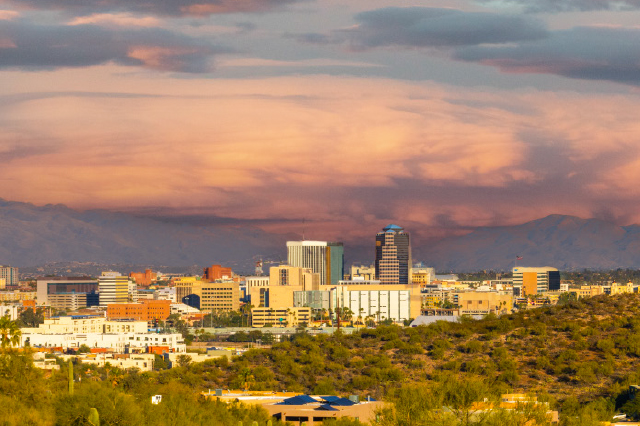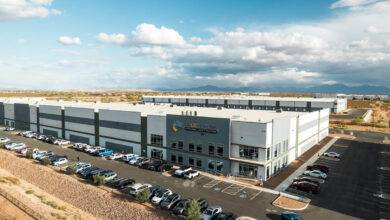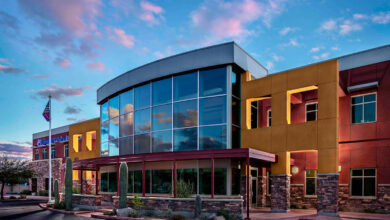
Tucson Ranked by Investors as a “Growth Frontier”
Imagine if you could approach investing in cities with the same strategies used in stock market trading. American cities operate with striking parallels to corporations—they offer a suite of ‘services’ to their ‘shareholders’ (the residents), they have ‘revenue streams’ from various taxes and funding, and their ‘market value’ fluctuates based on economic health and governance. Unlike companies, however, cities aren’t up for public investment. But what if they were?
If there was a ‘City Exchange,’ where you could buy and sell shares in American cities as if they were stocks, which city would you purchase shares in? Would you invest in the innovation hub of San Francisco, with its tech-driven economy? Or perhaps you’d see value in the steady growth and favorable tax climate of Austin, Texas. Maybe the resilience and historical significance of Boston would be more appealing, especially given its education and healthcare sectors.
The Stock Dork ran a survey of 3,000 investors to create a ‘City Confidence Index’. They asked respondents:
If cities were publicly traded on stock exchanges, which would you most want to invest in?
The top 10 were as follows:
1. Jacksonville, Florida
Jacksonville emerged as the most investible city in the U.S. It offers a unique investment appeal due to its extensive port facilities, which make it a key player in maritime trade. The city’s strategic location in Florida also serves as a gateway for business and tourism in the Southeastern United States. With a growing population, affordable housing, and diverse economic base including finance, healthcare, and logistics, Jacksonville could be a promising investment for those looking at long-term growth and stability.
2. Fort Lauderdale, Florida
Known for its beautiful beaches, boating canals, and vibrant tourism industry, Fort Lauderdale could be an attractive investment destination. The city’s economy is bolstered by a thriving tourism sector, an expanding aerospace and aviation industry, and a growing technology sector. Fort Lauderdale’s appeal is also enhanced by its proximity to Miami, making it part of a larger, economically dynamic region.
3. Boston, Massachusetts
Boston’s strength lies in its prestigious educational institutions and robust healthcare sector. The city came in 3rd place overall. As a historical city, it also benefits from tourism and a rich cultural heritage. Investment in Boston could be seen as investing in intellectual capital and innovation, with the potential for spillover benefits from research and development in technology, biotechnology, and healthcare sectors.
4. Albany, New York
Albany, the capital city of New York State, has a diversified economy centered around government, healthcare, and education. With its stable job market, growing tech scene, and rich history, Albany presents an opportunity for steady, risk-averse investment. The city’s ongoing efforts in urban revitalization and its strategic location as a gateway to other major Northeast cities add to its appeal.
5. Coral Springs, Florida
Coral Springs, in 5th place, is known for its family-friendly atmosphere, excellent schools, and well-planned neighborhoods. This suburban city, with its focus on community development and quality of life, could attract investors looking for stability and consistent growth. The city’s economic development initiatives aimed at attracting small and medium-sized businesses also make it an attractive investment choice.
6. Santa Barbara, California
Santa Barbara, with its picturesque coastline and Mediterranean climate, is a prime location for tourism and high-end real estate. The city’s economy benefits from a mix of education, technology, and healthcare sectors. Investment in Santa Barbara might appeal to those looking for a combination of luxury real estate, a strong tourism sector, and a stable local economy.
7. Boynton Beach, Florida
In 7th position, Boynton Beach in South Florida offers a mix of coastal living and urban convenience. The city’s redevelopment initiatives, growing retail and business sectors, and attractive real estate market could make it a lucrative option for investors. Additionally, its proximity to larger cities like West Palm Beach and Fort Lauderdale adds to its investment appeal.
8. Providence, Rhode Island
Providence’s investment appeal lies in its rich cultural heritage, educational institutions like Brown University and Rhode Island School of Design, and its growing healthcare sector. The city’s ongoing efforts in revitalizing its downtown and waterfront areas, along with its vibrant arts scene, make it an attractive option for those interested in urban redevelopment and cultural investments.
9. Tucson, Arizona
Tucson’s investment potential is anchored in its unique blend of education (home to the University of Arizona), aerospace and defense industries, and a growing technology sector. The city’s affordable cost of living, coupled with its rich cultural heritage and natural beauty, makes it an attractive option for a diverse range of investors.
10. Columbus, Ohio
Rounding up the top 10 came Columbus. As the capital city of Ohio, it boasts a diverse and robust economy with strengths in education, healthcare, finance, and technology. The city’s large student population, driven by Ohio State University, fuels innovation and a dynamic workforce. Columbus’s ongoing urban development and revitalization projects, combined with a relatively low cost of living, make it an attractive investment destination for those looking at burgeoning midwestern cities.
Arizona has 4 other investible cities in America.
122. Scottsdale
Scottsdale benefits from its desert landscapes, sunny climate, and proximity to major transportation routes such as Loop 101 and Loop 202. The city’s economy is diverse, with strengths in industries such as tourism, healthcare, technology, finance, and retail. Scottsdale is home to numerous resorts, spas, golf courses, medical facilities, tech startups, financial services firms, and upscale shopping centers, providing job opportunities and economic stability for residents. Scottsdale’s real estate market offers opportunities for investment in residential, commercial, and hospitality properties.
124. Yuma
Situated in the southwestern corner of Arizona, Yuma benefits from its proximity to the California and Mexico borders, its access to transportation routes such as Interstate 8 and the Yuma International Airport, and its status as one of the most productive agricultural regions in the United States. The city’s economy is diverse, with strengths in industries such as agriculture, tourism, military, healthcare, and retail. Yuma is known for its year-round farming activities, which include the cultivation of lettuce, citrus fruits, and winter vegetables. Additionally, the city attracts tourists with its historical sites, outdoor recreational opportunities, and cultural events. Yuma is also home to military installations like Marine Corps Air Station Yuma, which contribute to its economic stability. Yuma’s real estate market offers opportunities for investment in residential, commercial, and agricultural properties.
163. Glendale
The city’s economy is diverse, with strengths in industries such as sports and entertainment, healthcare, education, aerospace, and technology. Glendale is home to major sports venues like State Farm Stadium and Gila River Arena, as well as medical centers, educational institutions like Midwestern University, aerospace companies, technology firms, and manufacturing facilities, providing job opportunities and economic stability for residents. Glendale’s real estate market offers opportunities for investment in residential, commercial, and hospitality properties. The city’s growing population, business-friendly environment, and cultural attractions contribute to its attractiveness as a place to live and invest. Investors may find Glendale appealing for its strong economic fundamentals, affordable cost of living, and development opportunities.
232. Tempe
Situated in the Phoenix metropolitan area, Tempe benefits from its central location in the region, access to major transportation routes such as Interstate 10 and Loop 101, and its role as a hub for innovation, education, and culture. The city’s economy is diverse, with strengths in industries such as technology, education, healthcare, tourism, and manufacturing. Tempe is home to major employers like Arizona State University, State Farm, Intel, healthcare providers, hospitality establishments, and manufacturing companies, providing job opportunities and economic stability for residents. Tempe’s real estate market offers opportunities for investment in residential, commercial, and mixed-use properties.





